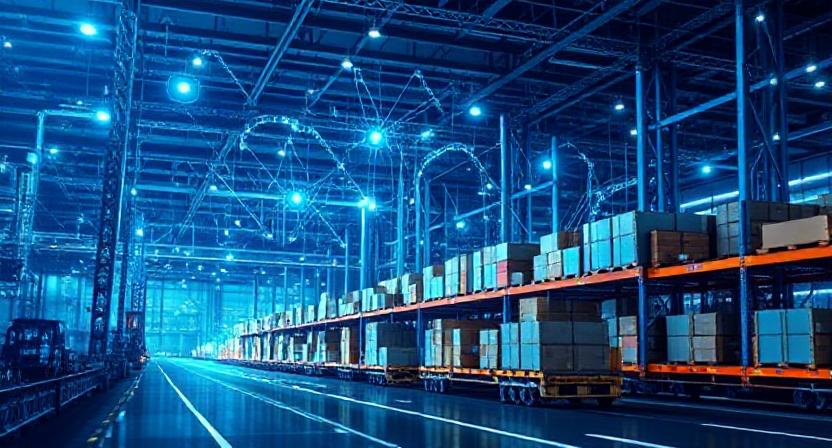
How AI Enables Real-Time Personalization for Websites
March 20, 2025
AI in Event Marketing: From Planning to Post-Event Analysis
March 21, 2025Artificial Intelligence (AI) is transforming the way businesses manage their supply chains and execute marketing strategies. Supply chain marketing, which focuses on ensuring smooth logistics, inventory management, and product delivery while maintaining customer engagement, can greatly benefit from AI-driven insights. With AI, companies can optimize demand forecasting, personalize marketing efforts, automate logistics, and enhance customer experience. The combination of AI and supply chain marketing allows businesses to achieve higher efficiency, reduce operational costs, and improve decision-making based on real-time data analysis. This article explores how AI is revolutionizing supply chain marketing, the benefits it brings, and how businesses can implement AI-driven strategies to stay competitive in a rapidly evolving marketplace.

Understanding Supply Chain Marketing
Supply chain marketing refers to the strategies used by businesses to align supply chain operations with customer demands. It involves integrating marketing efforts with inventory management, distribution, and logistics to ensure that products reach customers efficiently and cost-effectively. Traditionally, supply chain marketing faced challenges such as inaccurate demand forecasting, inventory mismanagement, and inefficiencies in logistics. Many businesses struggled with slow response times to market fluctuations, leading to overstocking or stock shortages. The increasing reliance on data and automation has paved the way for AI to optimize supply chain marketing by analyzing vast amounts of information, predicting trends, and enabling more strategic decision-making.

The Role of AI in Supply Chain Marketing
AI plays a crucial role in improving supply chain marketing by providing real-time insights, optimizing inventory levels, and enhancing operational efficiency. One of the most impactful applications of AI is predictive analytics, which helps businesses anticipate demand fluctuations, identify purchasing patterns, and optimize inventory management. Machine learning algorithms analyze historical data and detect patterns that humans might overlook, allowing businesses to proactively adjust their supply chain operations. Additionally, AI-powered automation streamlines logistics and reduces human errors, ensuring that products are delivered promptly while minimizing costs. Companies that integrate AI into their supply chain marketing gain a competitive advantage by improving efficiency and responsiveness to market changes.

AI-Driven Personalization in Supply Chain Marketing
AI-driven personalization enhances the customer experience by delivering tailored product recommendations, customized marketing messages, and individualized promotions. AI analyzes customer data, including browsing history, past purchases, and engagement patterns, to segment customers based on their preferences. By leveraging this data, businesses can create highly targeted marketing campaigns that resonate with specific customer groups. AI-powered recommendation engines, such as those used by e-commerce giants like Amazon, suggest relevant products to customers, increasing conversion rates and boosting revenue. Furthermore, AI-driven chatbots provide personalized assistance, answering customer inquiries and guiding them through the buying process. This level of personalization strengthens customer relationships and fosters brand loyalty.

AI-Powered Demand Forecasting
Accurate demand forecasting is essential for supply chain efficiency, as it prevents stockouts and reduces excess inventory. AI improves demand forecasting by analyzing historical sales data, market trends, and external factors such as economic indicators, weather conditions, and competitor activities. Machine learning models continuously refine their predictions, becoming more accurate over time. By leveraging AI-driven demand forecasting, businesses can optimize their production schedules, streamline inventory management, and allocate resources more effectively. Retailers, for example, use AI to anticipate seasonal demand fluctuations and ensure that popular products are stocked at the right time. This proactive approach minimizes waste, enhances customer satisfaction, and maximizes profitability.

Enhancing Logistics and Distribution with AI
AI enhances logistics and distribution by optimizing routes, improving delivery efficiency, and automating warehouse operations. AI-powered route optimization analyzes traffic patterns, weather conditions, and delivery schedules to determine the most efficient paths for shipments. This reduces fuel costs, shortens delivery times, and improves customer satisfaction. Automated warehouse management systems powered by AI use robotics and IoT sensors to streamline inventory tracking, order fulfillment, and storage organization. AI also facilitates better decision-making when selecting suppliers and vendors by analyzing factors such as cost, reliability, and delivery speed. These advancements in logistics and distribution create a more agile and efficient supply chain.

Chatbots and AI-Driven Customer Support
AI-driven chatbots have revolutionized customer support by providing instant, 24/7 assistance. These virtual assistants handle customer inquiries, process orders, and provide real-time shipment updates. AI chatbots analyze customer queries to understand intent and deliver relevant responses, reducing the workload on human agents. In B2B supply chain marketing, chatbots help businesses manage supplier relationships by answering vendor inquiries and automating procurement processes. Additionally, AI-powered chatbots use sentiment analysis to gauge customer satisfaction and adjust responses accordingly. By integrating chatbots into their customer support strategy, businesses can enhance customer experience while reducing operational costs.

Leveraging AI for Competitive Pricing Strategies
AI enables businesses to develop dynamic pricing strategies based on real-time market conditions, competitor pricing, and customer behavior. Machine learning algorithms continuously monitor pricing trends and recommend optimal price points to maximize revenue and maintain competitiveness. AI-driven price optimization helps businesses adjust their prices in response to supply and demand fluctuations, seasonal trends, and promotional campaigns. Retailers, for instance, use AI to implement personalized pricing, offering discounts or price adjustments based on individual customer profiles. This level of pricing intelligence allows businesses to attract customers while maintaining profitability.

AI in Content and Social Media Marketing for Supply Chains
AI automates content creation and social media marketing by analyzing audience preferences and engagement patterns. AI-powered tools generate personalized content, such as product descriptions, blog posts, and social media posts, that align with customer interests. Sentiment analysis helps businesses gauge public perception and adjust their marketing strategies accordingly. AI also optimizes social media advertising by identifying the most effective targeting parameters and predicting campaign performance. By leveraging AI in content marketing, businesses can enhance brand visibility, improve customer engagement, and drive higher conversion rates.

AI-Powered Marketing Analytics and ROI Measurement
AI improves marketing analytics by providing deep insights into campaign performance, customer behavior, and return on investment (ROI). AI-powered attribution models analyze multiple touchpoints in the customer journey to determine which marketing efforts contribute to conversions. This helps businesses allocate their marketing budget more effectively. AI also tracks key performance indicators (KPIs) such as customer acquisition cost, conversion rates, and engagement metrics, allowing marketers to refine their strategies. By leveraging AI-driven analytics, businesses can measure the effectiveness of their campaigns and make data-driven decisions for future marketing efforts.

Overcoming Challenges in AI Adoption
While AI offers significant benefits, businesses must overcome challenges such as data privacy concerns, integration complexities, and the cost of AI implementation. Data security regulations, such as GDPR, require businesses to handle customer data responsibly. Additionally, integrating AI with existing supply chain management systems requires careful planning and investment in technology infrastructure. Companies must also address the skills gap by training employees or hiring AI specialists. Despite these challenges, the long-term benefits of AI adoption outweigh the initial hurdles, making it a worthwhile investment for supply chain marketing.

Future Trends in AI and Supply Chain Marketing
The future of AI in supply chain marketing includes advancements such as hyper-personalization, AI-driven autonomous supply chains, and blockchain integration. AI-powered personalization will become even more refined, delivering individualized experiences based on real-time data. Autonomous supply chains, driven by AI and IoT, will enhance operational efficiency and reduce human intervention. Blockchain technology, combined with AI, will improve transparency, security, and trust in supply chain transactions. These innovations will further optimize supply chain marketing, creating more efficient, customer-centric operations.
Conclusion
AI is revolutionizing supply chain marketing by improving demand forecasting, logistics, customer engagement, and pricing strategies. Businesses that leverage AI-driven insights can optimize operations, enhance customer satisfaction, and maintain a competitive edge in the market. While AI adoption presents challenges, the long-term benefits far outweigh the costs. Companies that embrace AI in their supply chain marketing strategies will be better positioned for success in an increasingly digital and data-driven world.


